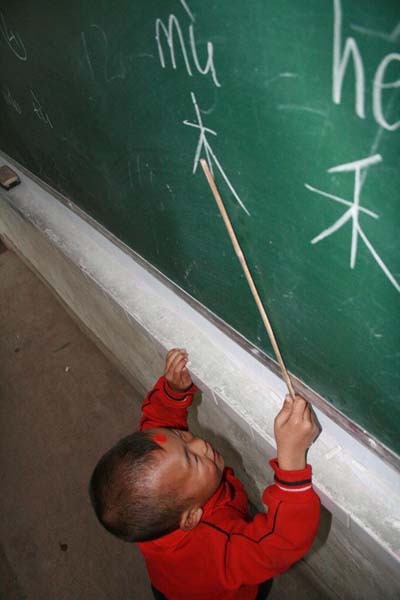Saving China's rural schools
- By Zhou Jing
 0 Comment(s)
0 Comment(s) Print
Print E-mail
China.org.cn, October 13, 2011
E-mail
China.org.cn, October 13, 2011
 |
|
Education experts have expressed concern about the lack of educational resources in local villages. |
When 11-year-old Zhao Shanzhong of Fenghuang Village, outside of Chongqing, was at the age of four, his father passed away. His mother later abandoned him to work in another area. As a result, his aging grandfather had to bring him up singlehandedly. They lived a poor life together until Zhao eventually left the village to study at a boarding school in town.
Zhao's family is an accurate portrayal of life in rural China. Among 239 students in Zhao's boarding school, 55.6 percent of them have been left behind by both parents and 35 percent by one parent to work in cities.
The proportion of children left behind by parents in rural areas can be as high as two-thirds in some areas, said Huo Xinhua, principal of Xibaipo Middle School in north China's Hebei Province.
As the birth rate in rural areas declines and children are moving to cities with their parents for school, less and less children are attending schools in their local villages. Many children are leaving their hometowns deep in the mountains for boarding schools in towns. To cope with the situation, local governments began to close down and merge some village schools.
Li Xiaoli, a teacher at Zhao's school in Fenghuang Village, used to work in a primary school in another village. In 1995, the school had six classes with 60 to 70 local students in each class. When Li left the village three years ago, children from four neighboring villages could only fill up three classrooms.
Due to this phenomenon, Peitian Village, a village with 800 years of history, has fewer opportunities to cultivate its own children. The village used to operate a well-known school named Nanshan Shuyuan. The school operated for 140 years from 1765 to 1905, leaving a profound impact on students and enriching the local community.
Wu Bifen, a student of Tsinghua University, who surveyed local residents in Fujian Province's Peitian Village, said most local residents in Peitian are above the age of 45 and below 13. The data is still incomplete, he said.
Education experts have expressed concern about the lack of educational resources in local villages.
Liang Hong, an associate professor of China Youth University of Political Sciences, said that despite the country's rapid economic growth, cultural education is essential to the China's development.
"The fact that industrial development is irreversible doesn't mean it is reasonable," said Liang Hong. "A person, a society or a country can not develop without the strong cornerstone of culture."
"Education without culture is like a tree without roots," said Professor Kang Jian of Peking University. "How can a tree grow without roots?"
In the spirit of reviving rural education in Fujian, Renmin University of China built a community university in Peitian Village a year ago. Here, students can receive computer training, read in the library, study art and culture, or join the university's dance troupe. Before the university's establishment, the village had only three grades in its primary school. The school has now resumed fourth grade classes and has 40 pupils attending.
Still in the experimental phase, Peitan Village's community university has yet to prove that it can be an efficient model for reviving rural education. However, it has shown rural children that they can find a path to higher education and a better life other than escaping villages for the city.






Go to Forum >>0 Comment(s)